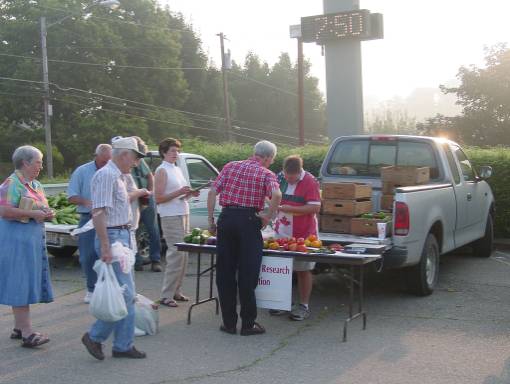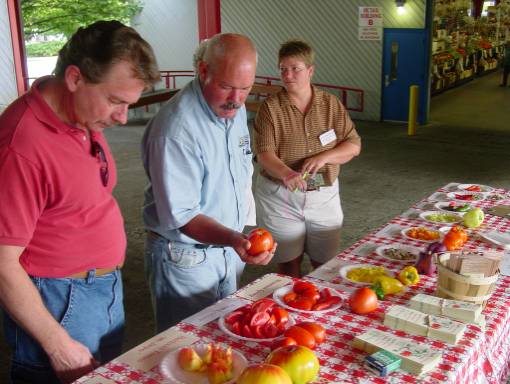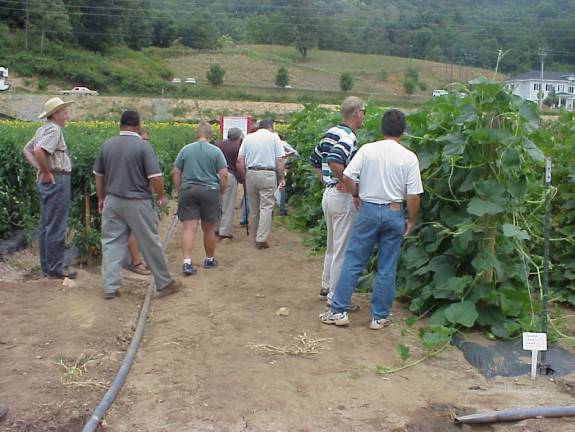Heirloom and Specialty Vegetable Production for Local Sales-2002 Report
go.ncsu.edu/readext?452320
en Español / em Português
El inglés es el idioma de control de esta página. En la medida en que haya algún conflicto entre la traducción al inglés y la traducción, el inglés prevalece.
Al hacer clic en el enlace de traducción se activa un servicio de traducción gratuito para convertir la página al español. Al igual que con cualquier traducción por Internet, la conversión no es sensible al contexto y puede que no traduzca el texto en su significado original. NC State Extension no garantiza la exactitud del texto traducido. Por favor, tenga en cuenta que algunas aplicaciones y/o servicios pueden no funcionar como se espera cuando se traducen.
Português
Inglês é o idioma de controle desta página. Na medida que haja algum conflito entre o texto original em Inglês e a tradução, o Inglês prevalece.
Ao clicar no link de tradução, um serviço gratuito de tradução será ativado para converter a página para o Português. Como em qualquer tradução pela internet, a conversão não é sensivel ao contexto e pode não ocorrer a tradução para o significado orginal. O serviço de Extensão da Carolina do Norte (NC State Extension) não garante a exatidão do texto traduzido. Por favor, observe que algumas funções ou serviços podem não funcionar como esperado após a tradução.
English
English is the controlling language of this page. To the extent there is any conflict between the English text and the translation, English controls.
Clicking on the translation link activates a free translation service to convert the page to Spanish. As with any Internet translation, the conversion is not context-sensitive and may not translate the text to its original meaning. NC State Extension does not guarantee the accuracy of the translated text. Please note that some applications and/or services may not function as expected when translated.
Collapse ▲This is a 2002 report from a NC Specialty Crops Program Project. It is posted for historical reference purposes.
Reviewed by Jeanine Davis, NC Alternative Crops & Organics Program, Department of Horticultural Science, NC State University on 10/10/2022.
PROJECT LEADER(S): Jeanine Davis, Dept. of Horticultural Science, NCSU
TYPE OF PROJECT: Research
LOCATION: Mountain Research Station – Waynesville, NC
IMPACT
Growing interest in specialty crops and locally grown produce offers profitable alternative markets for farmers in western NC. A demonstration garden was established in Haywood County to explore consumer preferences for these items. Test marketing and surveys revealed a strong demand for local produce, particularly heirloom tomatoes.
INTRODUCTION
This project was actually initiated by the staff of the Mountain Research Station. They were looking for produce that could be grown AND sold in Haywood County. We worked closely together to establish a large demonstration garden containing a wide variety of heirloom tomatoes, colored bell peppers, hot peppers, gourds, old-fashioned pumpkins, and broom corn. This garden was highly visible from the road and made available for inspection by all interested parties. Produce from the garden was used for marketing studies. For example, peppers and tomatoes were test marketed at the Waynesville Tailgate Market on several Saturday mornings. Customers were surveyed as they shopped. In addition, we took notes on consumer buying preferences. Before the day was over, Jeanine Davis took results of the day’s research to all the produce vendors on the market. A tomato and pepper taste test was conducted at the WNC Farmers’ Market in Asheville.
RESULTS AND CONCLUSIONS
A large number of consumers participated in the taste test and a strong preference for heirloom tomatoes was demonstrated. Discussions with the retail vendors on the market revealed that demand for heirloom tomatoes far exceeds supply. They encourage local growers to sell these tomatoes to vendors on the market because they cannot get them through their regular suppliers because the heirloom tomatoes are too fragile to ship. A field day was held to educate growers on the tremendous number of unique and old-timey varieties available to them.
This study demonstrated that there is a strong local market for locally grown produce, especially heirloom tomatoes. Several Haywood County growers will take advantage of this information in 2003. In addition, we will conduct a heirloom tomato variety trial in 2003 to assist with variety selection.
SURVEY
Haywood County Specialty Crops Survey for 2002
What is most important to you when you shop for produce?
81% Locally Grown
37% Quality
8.6% Price
Which of the items displayed here are you most likely to by?
71% Heirloom Tomatoes
23.6% Jalapeno Peppers
5.3% Thai Dragon Pepper
22% Ivory Bell Pepper
34% Yellow Bell Pepper
6% Chocolate Pepper
16% Hybrid Tomatoes
7% Long Cayenne Pepper
15% California Wonder Pepper
29% Lilac Pepper
12% Valencia Bell Pepper
Have you bought specialty fruits or vegetables in the past?
72.6% Yes
27% No
Please share your age range
1.6% 21-30 yrs
2.6% 31-40 yrs
17.3% 41-50 yrs
27.3% 51-60 yrs
28.6% 61-70 yrs
22.6% 71-80 yrs
Size of household
12.6% One person
67.0% Two
11.0% Three
9.0% Four or more
What fruit or vegetables do you want to buy from farmers but can’t find?
| Blue Lake Beans Snap Sweet Peas Zucchini Squash Fresh Asparagus Ramps Fresh Broccoli Sweet Potatoes Kiwi Organic Grown Greens Raspberries Yellow Cherries Kale |
Fresh Cantaloupe Turnips Green Mountain Potatoes Horse Radish Swiss Chard N.C. Peaches June Apples Egg Plant Kohlrabi White Corn Meal Rhubarb Cow Peas |
Source of data: 100 surveys were collected from WNC Farmers Market, Waynesville Tailgate Market and Ingles





